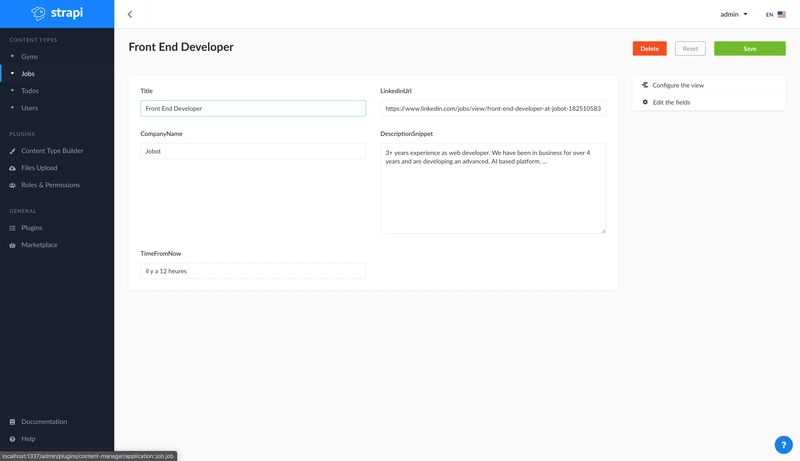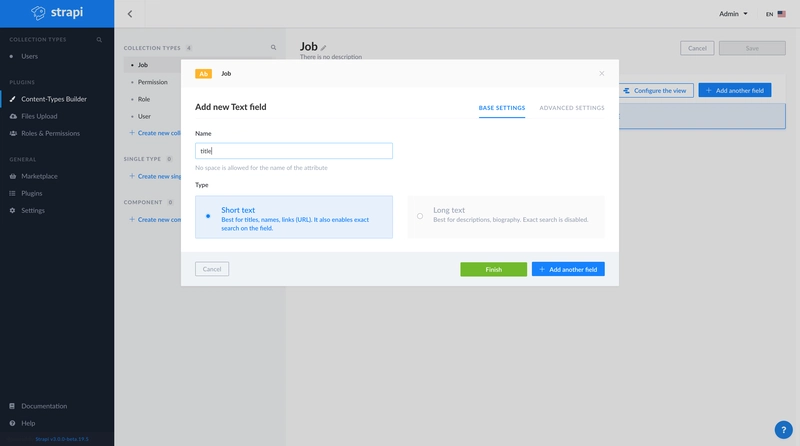Strapi,另一个用例:使用 Puppeteer 从任何网站构建你自己的 API
本教程的目标是使用 Strapi 和 Puppeteer 构建一个简单的求职搜索 API。Strapi是一个用 NodeJS 编写的开源Headless CMS ,而Puppeteer是一个基于 NodeJS 的开源Headless 浏览器(Chrome)API。
看来现在是无头工具的时代了……😆(无论如何,除了“无头”这个词之外,Strapi 和 Puppeteer 之间没有直接联系。)
斯特拉皮
Strapi 可用于轻松构建强大的 API。Strapi 提供了多种功能,包括 CRON 任务配置(这很有用,因为我们将使用它们来安排 Puppeteer 脚本的执行)。
1. Strapi 安装
好了,开始本教程吧。首先我们需要安装 Strapi。
yarn create strapi-app job-api --quickstart
如果您不想使用,文档
yarn中还有其他安装 Strapi 的可能性。
2. Strapi 管理员用户
此命令应该会安装 Strapi 并打开你的浏览器。然后,你将能够创建你的管理员用户。
3. 作业集合类型
在 Strapi 管理主页中,点击蓝色按钮CREATE YOUR FIRST CONTENT-TYPE。 您将被重定向到收藏类型创建表单。

对于我们的基本示例,我们需要创建五个文本字段(title、linkedinUrl、companyName、descriptionSnippet 和 timeFromNow)。
不要忘记点击“保存”按钮来重启 Strapi 服务器

之后,我们可以暂时将 Strapi 管理员放在一边,并在编辑器中打开 Strapi 存储库。
Strapi CRON 任务
首先,我们需要在 Strapi 服务器配置中启用 CRON。
打开config/environments/development/server.json文件
{
"host": "localhost",
"port": 1337,
"proxy": {
"enabled": false
},
"cron": {
"enabled": true
},
"admin": {
"autoOpen": false
}
}
然后让我们创建 CRON 任务。打开~/job-api/config/functions/cron.js文件并将内容替换为以下内容
"use strict";
module.exports = {
// The cron should display "{date} : My super cron task!" at every minute.
"*/1 * * * *": (date) => {
console.log(`${date} : My super cron task!\n`);
},
};
现在,重新启动 Strapi 服务器,让我们看看我们的 cron 任务是否正常运行。
yarn develop
yarn run v1.21.1
$ strapi develop
Project information
┌────────────────────┬──────────────────────────────────────────────────┐
│ Time │ Thu Apr 16 2020 01:40:49 GMT+0200 (GMT+02:00) │
│ Launched in │ 1647 ms │
│ Environment │ development │
│ Process PID │ 20988 │
│ Version │ 3.0.0-beta.18.7 (node v10.16.0) │
└────────────────────┴──────────────────────────────────────────────────┘
Actions available
Welcome back!
To manage your project 🚀, go to the administration panel at:
http://localhost:1337/admin
To access the server ⚡️, go to:
http://localhost:1337
Thu Apr 16 2020 01:41:00 GMT+0200 (GMT+02:00) : My super cron task !
Thu Apr 16 2020 01:42:00 GMT+0200 (GMT+02:00) : My super cron task !
Thu Apr 16 2020 01:43:00 GMT+0200 (GMT+02:00) : My super cron task !
...
我们可以看到{date} : My super cron task !终端上每分钟都会显示一次。
木偶师
Puppeteer 用于自动执行您在浏览器中可以执行的任何操作。您可以使用它来自动化流程、截取屏幕截图以及生成 PDF。在本教程中,我们将使用 Puppeteer 从 Linkedin 获取 ReactJS 职位列表。我们还将使用 Cheerio 从接收到的标记中选择数据。
现在 CRON 任务运行良好,我们将在 Strapi 项目中安装 Puppeteer 和 Cheerio。
cd job-api
yarn add puppeteer cheerio
让我们调整 CRON 任务以获取过去 24 小时内旧金山在 linkedin 上发布的 ReactJS 职位列表。
在~/job-api/config/functions/cron.js
"use strict";
// Require the puppeteer module.
const puppeteer = require("puppeteer");
module.exports = {
// Execute this script every 24 hours. (If you need to change the cron
// expression, you can find an online cron expression editor like
// https://crontab.guru
"0 */24 * * *": async (date) => {
// 1 - Create a new browser.
const browser = await puppeteer.launch({
args: ["--no-sandbox", "--disable-setuid-sandbox", "--lang=fr-FR"],
});
// 2 - Open a new page on that browser.
const page = await browser.newPage();
// 3 - Navigate to the linkedin url with the right filters.
await page.goto(
"https://fr.linkedin.com/jobs/search?keywords=React.js&location=R%C3%A9gion%20de%20la%20baie%20de%20San%20Francisco&trk=guest_job_search_jobs-search-bar_search-submit&redirect=false&position=1&pageNum=0&f_TP=1"
);
// 4 - Get the content of the page.
let content = await page.content();
},
};
使用 Cheerio解析 htmlcontent并使用 Strapi 全局存储作业。
"use strict";
const puppeteer = require("puppeteer");
const cheerio = require("cheerio");
module.exports = {
"0 */24 * * *": async (date) => {
const browser = await puppeteer.launch({
args: ["--no-sandbox", "--disable-setuid-sandbox", "--lang=fr-FR"],
});
const page = await browser.newPage();
await page.goto(
"https://fr.linkedin.com/jobs/search?keywords=React.js&location=R%C3%A9gion%20de%20la%20baie%20de%20San%20Francisco&trk=guest_job_search_jobs-search-bar_search-submit&redirect=false&position=1&pageNum=0&f_TP=1"
);
let content = await page.content();
// 1 - Load the HTML
const $ = cheerio.load(content);
// 2 - Select the HTML element you need
// For the tutorial case, we need to select the list of jobs and for each element, we will
// create a new job object to store it in the database with Strapi.
$("li.result-card.job-result-card").each((i, el) => {
if (Array.isArray(el.children)) {
const job = {
title: el.children[0].children[0].children[0].data,
linkedinUrl: el.children[0].attribs.href,
companyName:
el.children[2].children[1].children[0].data ||
el.children[2].children[1].children[0].children[0].data,
descriptionSnippet:
el.children[2].children[2].children[1].children[0].data,
timeFromNow: el.children[2].children[2].children[2].children[0].data,
};
// 4 - Store the job with the Strapi global.
strapi.services.job.create(job);
}
});
// 5 - Close the browser
browser.close();
},
};
重启 Strapi 服务器,然后返回到管理员页面http://localhost:1337/admin。
在职位内容管理器中,你应该可以看到来自 LinkedIn 的数据。

干得好!你几分钟就从另一个网站构建了一个 API 😄
文章来源:https://dev.to/hichamelbsi/strapi-another-use-case-build-your-own-api-from-any-website-with-puppeteer-h92 后端开发教程 - Java、Spring Boot 实战 - msg200.com
后端开发教程 - Java、Spring Boot 实战 - msg200.com

